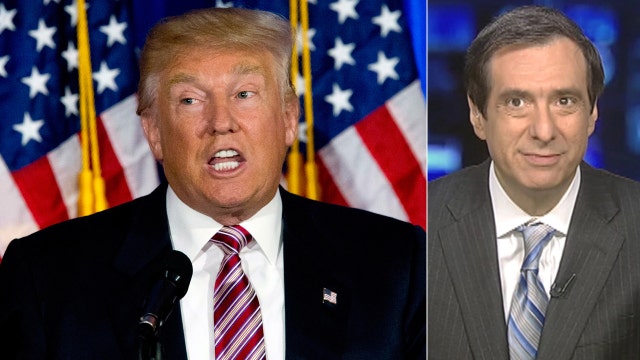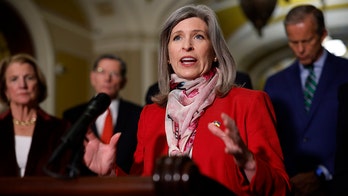Kurtz: Teleprompter Trump shifts gears
'MediaBuzz' host reacts to media coverage of Clinton and Trump speeches after primary wins on Tuesday
The pundits gave Hillary Clinton’s victory speech something close to a standing ovation, while their applause was rather tepid for Donald Trump reading off the prompter.
But the two de facto nominees faced dramatically different challenges on Tuesday night, and Trump’s was far tougher.
Clinton, after all, had finally knocked out Bernie Sanders, even if he remains in mathematical denial, and was celebrating the “milestone” for her gender as she broke the glass ceiling she had only cracked eight years ago.
Trump was trying to douse a firestorm within his own party, and that meant dousing his flame-throwing style. He had spent the previous few days being ripped apart by the media, along with Paul Ryan, Mitch McConnell and other GOP leaders.
Then, in a classic bait and switch, some in the pundit class who had insisted that Trump give a serious speech panned him for being too flat.
Reading a scripted speech is not a felony. Pols do it all the time. But while Trump was restrained and disciplined, he did sound at times like he was reciting a generic politician’s address, complete with canned applause lines like “I will never, ever let you down.”
Having declared in a statement that he’s done talking about his comments challenging the fairness of the judge in the Trump U. case because of his Mexican heritage, the billionaire made this oblique reference:
“Now I know some people say I'm too much of a fighter. My preference is always peace, however and I've shown that…But if I'm forced to fight for something I really care about, I will never, ever back down and our country will never, ever back down.”
The subliminal message: And if I get a little carried away at times, so be it.
Look, few speeches are as make-or-break as the press insists. Ordinary voters don’t care about a “pivot” as much as the commentators who chronicle these things.
But Trump is in an extraordinary situation. The Senate majority leader said he should apologize for his remarks about Judge Gonzalo Curiel. The House speaker said the comments were a textbook example of racism. Marco Rubio said he tried to warn people about this side of Trump.
It’s not that Trump is dependent on their endorsements. It’s the failure of the Republican establishment that created the conditions for Trump to capture the nomination.
But there is a growing sense of a civil war within the party that could be damaging. When GOP Sen. Mark Kirk un-endorses Trump by saying he doesn’t have the temperament to be president, it’s no surprise that Clinton used such language in her own speech.
Hillary isn’t a great orator, but in the last two weeks she has found a more conversational and confident speaking style.
As a man, I’m not allowed to talk about her voice without getting flak on Twitter, but four female journalists on MSNBC said she has learned to modulate her tone instead of trying to shout over the crowd.
Clinton embraced her gender-based journey at the top of the speech—something she barely acknowledged in 2008—and there’s no question that she is different than every other major-party nominee since 1788. Television anchors are wearing themselves out using the word “historic.”
Hillary’s emerging theme seems to be that she will unify the country while Trump is tearing his own party apart—and she’ll hammer away at that until he is able to shift the media focus back to her. He’ll attempt that in a speech next week, teased as the Clintons turning the “politics of personal enrichment” into an “art form.”
We went through numerous cycles in the primaries when Trump would act more “presidential,” only to start picking fights again with pols and pundits. That’s one reason veterans like McConnell are pleading with him to stay "on message."
But Trump’s great appeal has been that he’s not a carefully calibrated politician, that he speaks from the gut, that he sounds like a real person. In the hothouse environment of a general election, he has to avoid pointless distractions. But he also can’t abandon the street-fighting style that got him the nomination.





